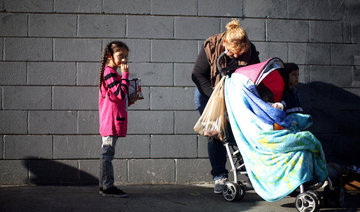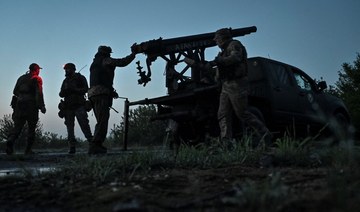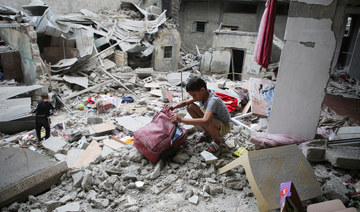SAN DIEGO: Christine Wade found a haven in the tent she shared with six children, pitched in an asphalt parking lot.
It was, at least, far better than their previous home in the city, a shelter where rats ate through the family’s bags of clothes and chewed on 2-year-old Jaymason’s stroller. Roughly 50 of the encampment’s 200 residents were children, so Wade’s kids had plenty of playmates.
“It’s peaceful here,” Wade, 31, who is eight months pregnant, said in an October interview. “There’s coffee first thing in the morning. We can hang out here in the daytime. I mean what more could you ask for?“
A tent, of course, is not a home. But for these San Diegans, it is a blessing.
Like other major cities all along the West Coast, San Diego is struggling with a homeless crisis. In a place that bills itself as “America’s Finest City,” renowned for its sunny weather, surfing and fish tacos, spiraling real estate values have contributed to spiraling homelessness, leaving more than 3,200 people living on the streets or in their cars.
Most alarmingly, the explosive growth in the number of people living outdoors has contributed to a hepatitis A epidemic that has killed 20 people in the past year — the worst US outbreak of its kind in 20 years. Deplorable sanitary conditions help spread the liver-damaging virus that lives in feces.
“Some of the most vulnerable are dying in the streets in one of the most desirable and livable regions in America,” a San Diego County grand jury wrote in its report in June — reiterating warnings it gave the city repeatedly over the past decade to better address homelessness.
San Diego has struggled to do that. Two years ago, Mayor Kevin Faulconer, a moderate Republican, closed a downtown tent shelter that operated for 29 years during winter months. He promised a “game changer” — a new, permanent facility with services to funnel people to housing.
But it wasn’t enough.
The result? Legions of Californians without shelter. A spreading contagion. Endless political disputes over what can and should be done — and mounting bills for taxpayers. Struggling schools and other institutions. And an extraordinary challenge to the city’s sunny identity that threatens its key tourism industry.
For now, San Diego again is turning to tents. The campground where the Wades lived was only temporary; this month, officials are opening three industrial-sized tents that will house a total of 700 people.
There are plans afoot to build less-makeshift housing. But to deal with the immediate emergency and operate the giant tents, the city had to take $6.5 million that had been budgeted for permanent homes.
Democrat Councilman David Alvarez cast the only vote against the plan. “Had we actually invested in a homeless strategy, we would not be here today being asked to warehouse 700 people in giant tents,” he said.
Republican Councilwoman Lorie Zapf’s mother was mentally ill and died homeless in Los Angeles. She agreed with Alvarez that the tents were not a perfect solution to San Diego’s crisis, but she could not in good conscience pass up a chance to get people off the streets.
“We need to do anything we can to stop this tsunami of people who are ending up on our sidewalks,” she said.
“The people of San Diego need to decide what they want the city to look like,” said Gordon Walker, who took the helm this summer of the San Diego Regional Task Force on the Homeless amid praise for his efforts in combating chronic homelessness in Utah.
“San Francisco has essentially given up its streets to the homeless,” added Walker, who served as deputy undersecretary for the US Department of Housing and Urban Development during the Reagan administration. “It could go either way here. The real issue is we don’t have enough housing.”
Last year, the number of people living outdoors in San Diego jumped 18 percent over the previous year, according to an annual count taken in January. More than 400 makeshift shelters sprung up downtown, covering sidewalks across from new high-rise apartment buildings that have climbed in lockstep with the booming biotech-heavy economy and soaring rents, among the nation’s highest. A studio apartment goes for around $1,500 a month, on average.
Most of the homeless, like the Wade family, did not migrate to San Diego to live on the streets but are local residents who became homeless in a city where rents increased nearly 8 percent in a year. High-rise buildings have replaced discount residential buildings that offered single rooms for rent, housing people living paycheck-to-paycheck. Nearly half of the 9,000 rooms have disappeared since 2003.
In October, as the hepatitis death toll climbed and the city declared a homeless emergency, Faulconer and the nonprofit Alpha Project opened the Balboa Park campground where the Wades found shelter. The city installed public washing stations, opened 24-hour restrooms and scrubbed streets with a bleach solution.
Police also cracked down, issuing hundreds of citations, largely for illegal lodging. Within weeks, the nearly 400 tents and tarps downtown were gone. Those who work with the homeless say they simply scattered.
“It could be like a campfire when all the embers are spread out. It either dies out or it catches other areas and makes a bigger fire than we originally had,” said Dr. Jeffrey Norris, the medical director of Father Joe’s Villages, which runs a clinic that treats 2,800 homeless annually.
The number of encampments hidden in the brush and bamboo along the banks of the San Diego River doubled.
“It’s being used as a toilet,” said Zapf, whose council district includes the river, bays and beaches.
The San Diego River Park Foundation’s mission is to preserve the river, a green ribbon that starts from snowmelt in the mountains east of San Diego and builds as it snakes through a valley of cottonwood groves and continues under freeway overpasses by shopping centers.
The foundation spent $115,000 removing 250,000 pounds of trash left by the homeless camps this year. Litter is carried by the river, which feeds into the Pacific at a popular dog beach.
Director Rob Hutsel said he gets asked by potential donors about the foundation’s plans to create a 52-mile-long river park and trail system: “What about the homeless? Don’t build a park. It’ll just bring in more.”
“Gosh, parks are good,” he said. “There shouldn’t be any thought about building a park. That’s so unfortunate.”
Most vulnerable dying in ‘America’s Finest City’
Most vulnerable dying in ‘America’s Finest City’
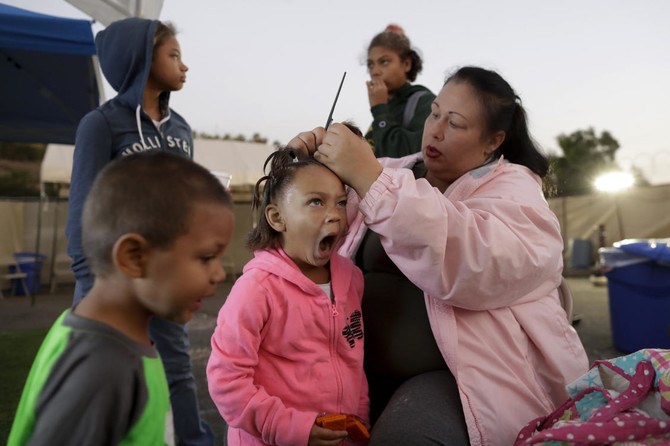
Afghan Taliban’s treatment of women under scrutiny at UN rights meeting
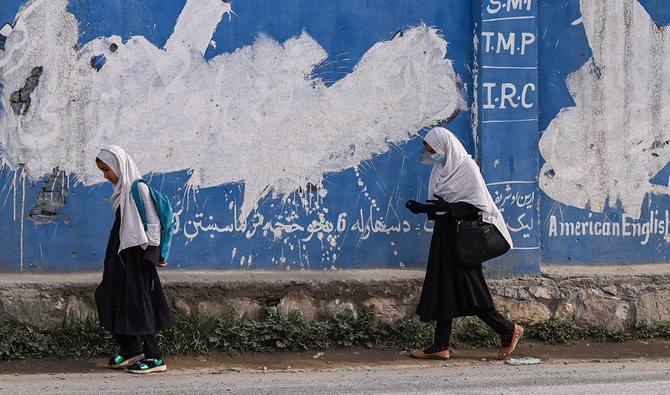
- The Taliban say they respect rights in line with their interpretation of Islamic law
- Taliban have barred girls from high school and women from universities and jobs
GENEVA: Afghanistan’s Taliban face criticism over their human rights record at a UN meeting on Monday, with Washington accusing them of systematically depriving women and girls of their human rights.
However, in an awkward first for the UN Human Rights Council, the concerned country’s current rulers will not be present because they are not recognized by the global body.
Afghanistan will instead be represented by an ambassador appointed by the previous US-backed government, which the Taliban ousted in 2021.
In a series of questions compiled in a UN document ahead of the review, the United States asked how authorities would hold perpetrators to account for abuses against civilians, “particularly women and girls who are being systematically deprived of their human rights“?
Britain and Belgium also raised questions about the Taliban’s treatment of women. In total, 76 countries have asked to take the floor at the meeting.
The Taliban say they respect rights in line with their interpretation of Islamic law.
Since they swept back into power, most girls have been barred from high school and women from universities. The Taliban have also stopped most Afghan female staff from working at aid agencies, closed beauty salons, barred women from parks and curtailed travel for women in the absence of a male guardian.
Under the US system, states’ human rights records are subject to peer review in public meetings of the Geneva-based Human Rights Council, resulting in a series of recommendations.
While non-binding, these can draw scrutiny of policies and add to pressure for reform.
The UN Human Rights Council, the only intergovernmental global body designed to protect human rights worldwide, can also mandate investigations whose evidence is sometimes used before national and international courts.
Indian students protest US envoy’s campus talk over Gaza war
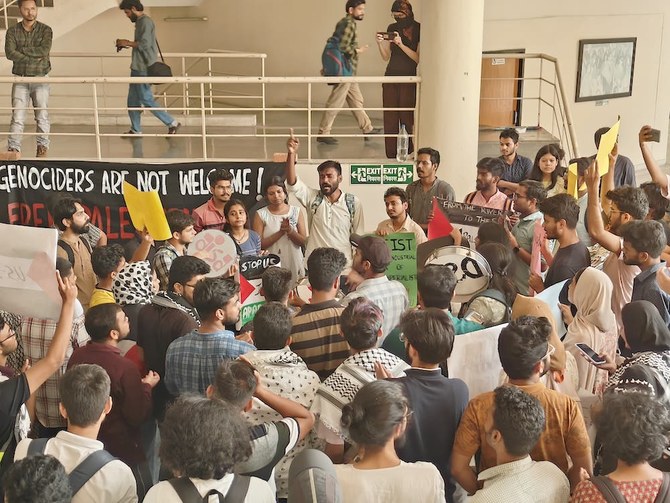
- Student-led protest led to university canceling an event involving US ambassador
- Indian students say they stand in solidarity with students protest across US
NEW DELHI: Students at one of India’s most prominent universities gathered in protest over an event involving the US ambassador to New Delhi on Monday, as they stood up against American support for Israel’s war on Gaza.
US Ambassador to India Eric Garcetti was invited for a talk on US-India ties at the Jawaharlal Nehru University in New Delhi on Monday afternoon, which would take place amid protests on American campuses demanding their universities cut financial ties with Israel over its military offensive in Gaza, which has killed more than 34,000 Palestinians.
At the university’s convention center, over 100 students organized by the Jawaharlal Nehru University Student Union protested the invitation of Garcetti, calling out his complicity “in the genocide Israel is currently doing in Palestine.”
JNUSU President Dhananjay told Arab News: “By calling such a person in the university … who is supporting the genocide, we want to tell them that JNU is not silent on this issue and we want to speak up.
“We are protesting against the US support for the genocide in Gaza committed by Israel.”
Hundreds of US college students have been arrested and suspended as peaceful demonstrations calling for a ceasefire in Gaza and divestment from companies linked to Israel spread across American campuses.
The student-led movement comes after nearly six months since Israel began its onslaught on the Gaza Strip, which Tel Aviv said was launched to stamp out the militant group Hamas.
Hundreds of thousands of housing units in the besieged territory have either been completely or partially destroyed, while the majority of public facilities, schools and hundreds of cultural landmarks have been demolished and continue to be targeted in intense bombing operations.
JNU student leaders said they stood in solidarity with the protesting students in the US.
“We are students, and we need to ask questions. If some atrocities are taking place and there are mindless killings going on, speaking out against this should be the responsibility of all sections of society,” Dhananjay said.
“The visuals that we see make us shiver and shake our conscience. If we don’t speak up, then I don’t think we have a right to be a social being.”
At the JNU campus on Monday, the student protest led to a cancellation of the event involving the US envoy.
“We feel happy that we forced the administration to cancel the talks by the ambassador,” JNUSU Vice President Avijit Ghosh told Arab News.
Despite India’s historic support for Palestine, the government has been mostly quiet in the wake of Israel’s deadly siege of Gaza.
When Indians went to the streets in the past months to protest and raise awareness on the atrocities unfolding in Gaza, their demonstrations were dispersed by police and campaigns stifled.
Members of Indian civil society have since come together to challenge their government’s links with Tel Aviv and break Delhi’s silence on Israel’s war crimes against Palestinians, reflecting similar concerns that some university students also felt.
“The US is supporting Israel in the killing of Palestinian people in Gaza. It’s also suppressing students in its country who are raising voice against the genocide in Gaza,” Ghosh said.
“We are agitated that India is being a mute spectator and not taking a clear stand against the ongoing genocide in Gaza.”
Ukraine’s Zelensky urges US to speed up weapons deliveries
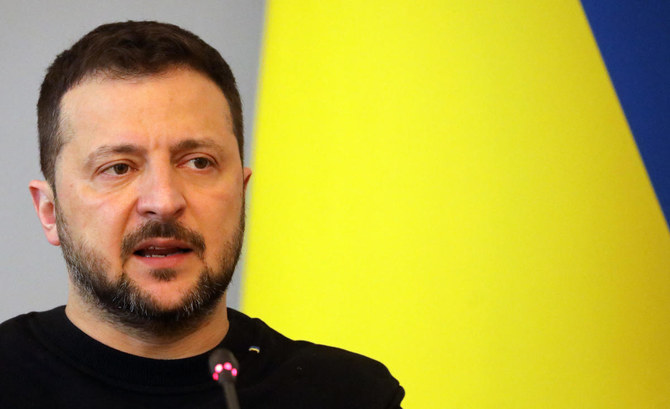
KYIV: President Volodymyr Zelensky said on Monday that vital US weapons were starting to arrive in Ukraine in small amounts and that the process needed to move faster as advancing Russian forces were trying to take advantage.
Zelensky told a joint news conference in Kyiv alongside visiting NATO chief Jens Stoltenberg that the situation on the battlefield directly depended on the speed of ammunition supplies to Ukraine.
“Timely support for our army. Today I don’t see anything positive on this point yet. There are supplies, they have slightly begun, this process needs to be sped up,” he said.
Scotland’s Humza Yousaf quits in boost to Labour before UK vote
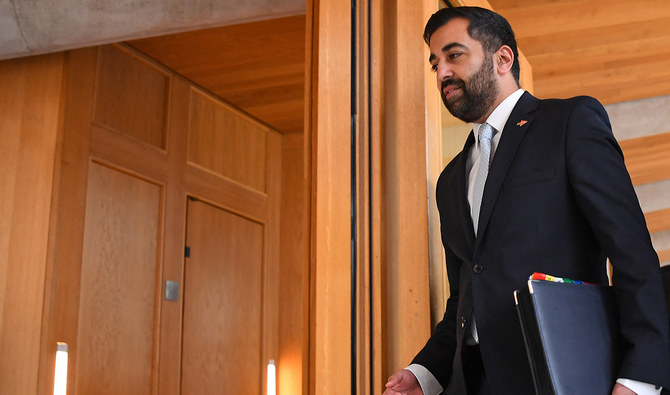
- Yousaf quit after a week of chaos triggered by his scrapping of a coalition agreement with Scotland’s Greens
- He then failed to secure enough support to survive a vote of no confidence against him expected later this week
LONDON: Scotland’s leader Humza Yousaf resigned on Monday, further opening the door to the UK opposition Labour Party regaining ground in its former Scottish heartlands during a national election expected to be held later this year.
Yousaf said he was quitting as head of the pro-independence Scottish National Party (SNP) and first minister of Scotland’s devolved government after a week of chaos triggered by his scrapping of a coalition agreement with Scotland’s Greens.
He then failed to secure enough support to survive a vote of no confidence against him expected later this week.
Resigning little over a year after he replaced Nicola Sturgeon as first minister and SNP leader, Yousaf said it was time for someone else to lead Scotland.
“I’ve concluded that repairing our relationship across the political divide can only be done with someone else at the helm,” Yousaf said, adding he would continue until a successor was chosen in an SNP leadership contest.
Yousaf abruptly ended a power-sharing agreement between his pro-independence SNP and the Green Party after a row over climate change targets. The SNP’s fortunes have faltered over a funding scandal and the resignation of Sturgeon as party leader last year. There has also been infighting over how progressive its pitch should be as it seeks to woo back voters.
Caught between defending the record of the coalition government and some nationalists’ demands to jettison gender recognition reforms and refocus on the economy, Yousaf was unable to strike a balance that would ensure his survival.
The SNP is losing popular support after 17 years of heading the Scottish government. Earlier this month, polling firm YouGov said the Labour Party had overtaken the SNP in voting intentions for a Westminster election for the first time in a decade.
Labour’s resurgence in Scotland adds to the challenge facing British Prime Minister Rishi Sunak’s Conservative Party which is lagging far behind Labour in UK-wide opinion polls.
The Scottish parliament now has 28 days to choose a new first minister before an election is forced, with former SNP leader John Swinney and Yousaf’s former leadership rival Kate Forbes seen as possible successors.
If the SNP is unable to find a new leader to command support in parliament, a Scottish election will be held. Yousaf, the first Muslim head of government in modern Western Europe, succeeded Sturgeon as first minister in March 2023. Once hugely popular, Sturgeon has been embroiled in a party funding scandal with her husband, who was charged this month with embezzling funds. Both deny wrongdoing.
Iran slams crackdown on US student protesters
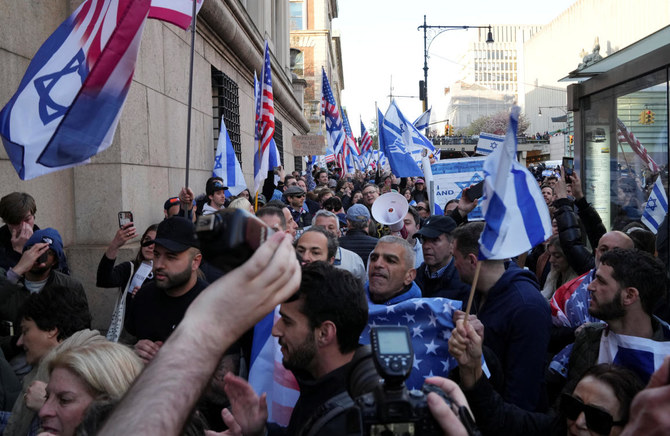
- The demonstrations began at Columbia University in New York and have since spread across the country
Tehran: Iran on Monday criticized a police crackdown in the United States against university students protesting against the rising death toll from the Israel-Hamas war in the Gaza Strip.
“The American government has practically ignored its human rights obligations and respect for the principles of democracy that they profess,” foreign ministry spokesman Nasser Kanani said.
Tehran “does not at all accept the violent police and military behavior aimed at the academic atmosphere and student demands,” he said.
American universities have been rocked by pro-Palestinian demonstrations, triggering campus clashes with police and the arrest of some 275 people over the weekend.
The demonstrations began at Columbia University in New York and have since spread across the country.
In Iran, hundreds of people demonstrated in Tehran and other cities on Sunday in solidarity with the US demonstrations.
Some carried banners proclaiming “Death to Israel” and “Gazans are truly oppressed,” state media reported.
The Gaza war broke out after the October 7 attack by Palestinian militants on Israel which killed 1,170 people, mostly civilians, according to Israeli figures.
Tehran backs Hamas, but has denied any direct involvement in the attack.
Israel’s retaliatory offensive against Hamas has since killed at least 34,488 people in Gaza, mostly women and children, according to the Hamas-run territory’s health ministry.
“What we have seen in American universities in recent days is an awakening of the world community and world public opinion toward the Palestinian issue,” Kanani said.
“It is not possible to silence the loud voices of protesters against this crime and genocide through police action and violent policies.”


